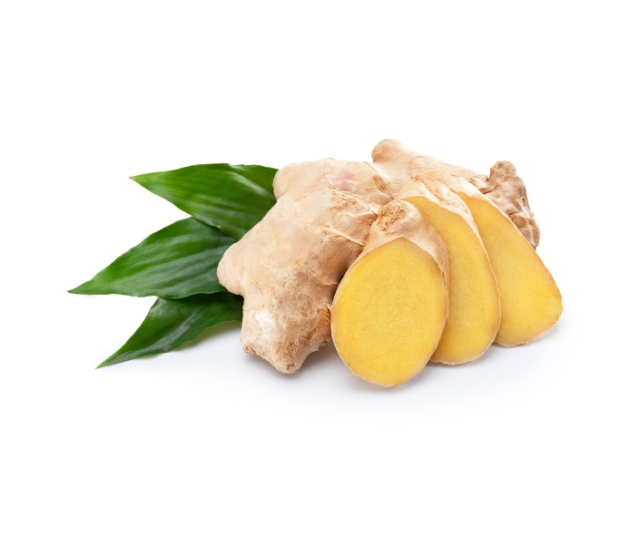Ginger , known scientifically as Zingiber officinale , is a plant with a long history of medicinal use in various cultures around the world. Throughout the centuries, this aromatic root has been prized not only for its spicy and unique flavor, but also for its numerous health benefits.
Nutritional Properties of Ginger
The nutritional properties of ginger are an essential part of its value as a superfood. This aromatic root not only provides a spicy and unique flavor to various culinary preparations, but is also loaded with bioactive compounds that make it a valuable ingredient for health. Below, we will delve into the key nutritional properties of ginger:
Gingerol and Bioactive Compounds:
Gingerol is the most prominent bioactive compound in ginger and is responsible for many of its beneficial properties. It acts as a powerful antioxidant and natural anti-inflammatory. This compound not only provides the characteristic spicy flavor of ginger, but also confers a number of health benefits.
Vitamins:
Ginger is a source of several essential vitamins that play a vital role in maintaining health:
Vitamin C: This vitamin is known for its role in strengthening the immune system and its ability to fight free radicals that can damage the body's cells.
Vitamin B6 (Pyridoxine) : Pyridoxine is essential for the metabolism of proteins, fats and carbohydrates. It also plays a key role in the health of the nervous system and the formation of blood cells.
Minerals:
Ginger is also a source of minerals essential for health:
Potassium: Potassium is crucial for cardiovascular function and blood pressure regulation. It helps maintain fluid balance in the body and can prevent water retention.
Magnesium: Magnesium is necessary for more than 300 biochemical reactions in the body. Contributes to the proper functioning of muscles, nerves and the immune system.
Dietary fiber:
Ginger contains dietary fiber, which is beneficial for digestive health. Fiber helps prevent constipation, promotes bowel regularity, and contributes to an overall healthy digestive system. Additionally, it can help maintain healthy cholesterol levels by binding to cholesterol in the intestine and aiding in its elimination from the body.
Calories and Macronutrients:
Ginger is relatively low in calories, making it a suitable component for a balanced diet. For every 100 grams of fresh ginger, you generally get about 80 calories. In terms of macronutrients, ginger provides a small amount of protein and carbohydrates, but its real nutritional value lies in its bioactive compounds and micronutrients.
Health Benefits of Ginger
1. Anti-inflammatory properties
The gingerol present in ginger has powerful anti-inflammatory properties that can help reduce inflammation in the body. This is especially beneficial for people who suffer from chronic inflammatory diseases such as arthritis.
2. Relief from Nausea and Dizziness
Ginger has been shown to be effective in relieving nausea and dizziness, especially in cases of pregnancy, motion sickness, and chemotherapy. Many people find relief by consuming ginger in tea or capsule form.
3. Improved Digestion
Ginger can help relieve digestive problems such as indigestion and upset stomach. It helps relax the muscles of the gastrointestinal tract, thus promoting a smoother digestive process.
4. Reduction of Menstrual Pain
Ginger may be helpful for women who experience severe menstrual pain. Its anti-inflammatory properties can help reduce cramps and discomfort associated with menstruation.
5. Diabetes Control
Some studies suggest that ginger may help control blood sugar levels by improving insulin sensitivity. This could be beneficial for people with type 2 diabetes.
6. Anticancer Potential
While more research is needed, some preliminary studies suggest that ginger may have anti-cancer properties. Compounds in ginger may help inhibit the growth of certain cancer cells.
7. Support for the Immune System
Ginger is a source of vitamin C, which is known to strengthen the immune system. Consuming ginger regularly can help prevent illnesses and common colds.
8. Cholesterol Reduction
The fiber present in ginger can help reduce blood cholesterol levels, which in turn reduces the risk of cardiovascular diseases.
9. Antioxidant Properties
Ginger is rich in antioxidants that help fight oxidative stress in the body. This can contribute to the prevention of chronic diseases and healthy aging.
Ways to Consume Ginger
There are several ways to incorporate ginger into your diet to take advantage of its health benefits:
- Ginger tea: Making a ginger infusion is a popular way to consume it. Simply cut slices of fresh ginger and add it to hot water with honey and lemon.
- Powdered Ginger: Powdered ginger can be used as a spice in a variety of dishes, from soups to desserts.
- Ginger supplements: You can also find ginger supplements in capsule or tablet form at health food stores or pharmacies.
- Fresh ginger: Adding grated or sliced fresh ginger to your meals is a delicious way to incorporate it into your daily diet.
Precautions and Contraindications
Although ginger offers many health benefits, it is important to keep some precautions in mind:
- Drug interaction: If you are taking anticoagulant or antiplatelet medications, consult your doctor before consuming ginger, as it may have anticoagulant effects.
- Excessive doses: Consuming large amounts of ginger in supplement form can have side effects, such as upset stomach.
- Pregnancy: If you are pregnant, consult a health professional before consuming large amounts of ginger, as it may stimulate uterine contractions.
Ginger is a natural health treasure that offers a wide range of benefits, from anti-inflammatory properties to nausea relief and digestion improvements. However, it is important to use it in moderation and consult a healthcare professional if you have specific medical concerns or conditions. By properly incorporating ginger into your diet, you can harness its potential to improve your overall well-being and quality of life.
